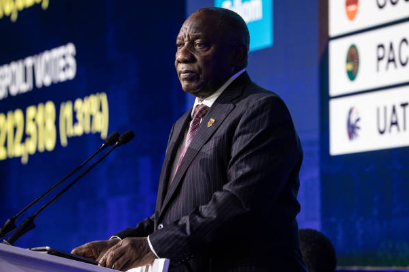South Africa was on tenterhooks on Monday for the African National Congress (ANC) to signal whom it will choose as a partner to govern the nation after it lost its majority in last week’s election for the first time in 30 years of democracy.
The ANC had comfortably won every previous election since the end of apartheid in 1994 but this time voters weary of joblessness, inequality and rolling power blackouts gave it just 40.2% of the vote, down from 57.5% five years ago.
Its vote share was still the largest of any party but was not enough for the ANC to govern alone, thrusting South Africa into unknown political territory.
“This moment in our country calls for responsible leadership and constructive engagement,” said President Cyril Ramaphosa in a weekly newsletter published on Monday.
The ANC’s potential partners are diametrically opposed, ranging from the free-marketeer Democratic Alliance (DA) to uMkhonto we Sizwe(MK) and the Economic Freedom Fighters (EFF), parties that advocate nationalising mines and banks and redistributing land.
“We would work with anyone who wants to work with us but not with a cap in the hand,” ANC secretary-general Fikile Mbalula said late on Sunday after the official results were announced.
With the future direction of government policy at stake, a working committee of 27 ANC officials was scheduled to meet on Monday to prepare a presentation on the party’s options to be delivered to the National Executive Committee on Tuesday.
Under the constitution, the newly elected parliament must convene within two weeks of the results being declared, and its first act must be to choose the nation’s next president.
So far, ANC officials who have spoken in public have rallied round Ramaphosa but he may nevertheless come under pressure, whether from an internal challenge or from other parties refusing to work with him.
TOUGH TALKS AHEAD
“It is going to be very difficult coalition negotiations, even more so for the ANC because of its internal contradictions,” said Zwelinzima Ndevu, director of the School of Public Leadership at Stellenbosch University.
He said there would be “huge pushback” within the party over the prospect of pairing up with the DA, which came second in the election with 21.8% of the vote. If that proved insurmountable, he said the likeliest partners would be the EFF and the Inkatha Freedom Party, which received 9.5% and 3.6% respectively.
The dark horse in the election was MK, a new party led by former president Jacob Zuma, which received 14.6% of the vote.
A divisive figure who remains popular in his home province of KwaZulu-Natal, Zuma was forced to quit as president in 2018 after a string of scandals and has since become an implacable enemy of Ramaphosa.
“I don’t see anything happening with MK,” said Ndevu.
MK has said it is considering a court challenge to the election results despite its strong showing.
Analysts have long feared Zuma’s party may stir up trouble if his supporters reject the results. They rioted and looted for days when he was arrested for contempt of court in 2021.
In his newsletter, Ramaphosa urged South Africans to stand firm against any attempts to undermine the constitutional order, saying: “There can be no place for threats of violence or instability.”
(Reuters)




















